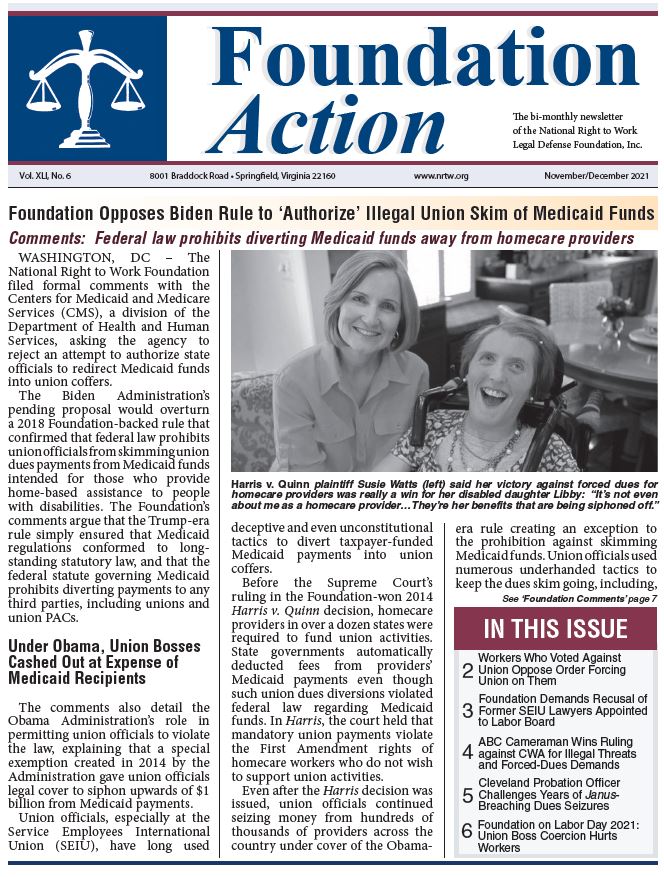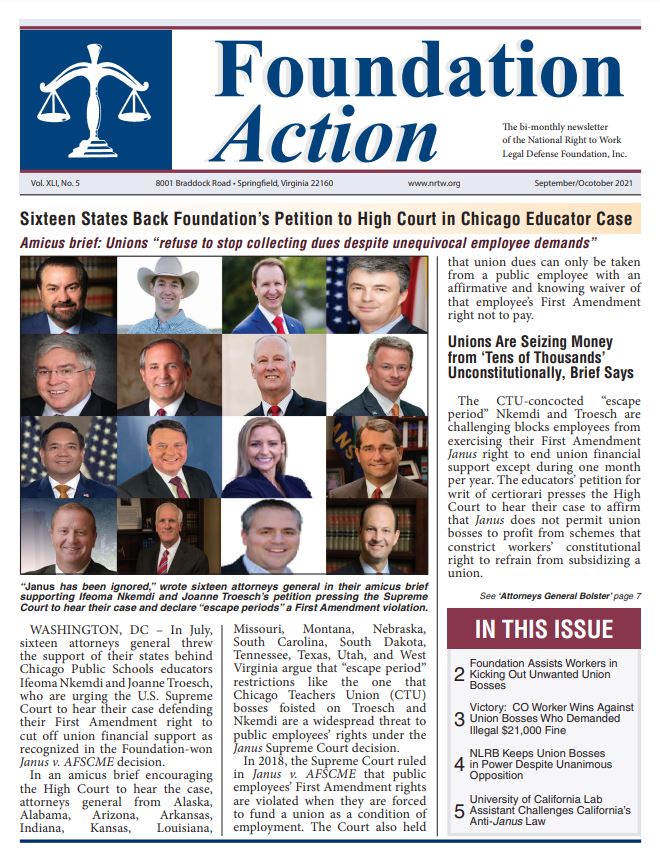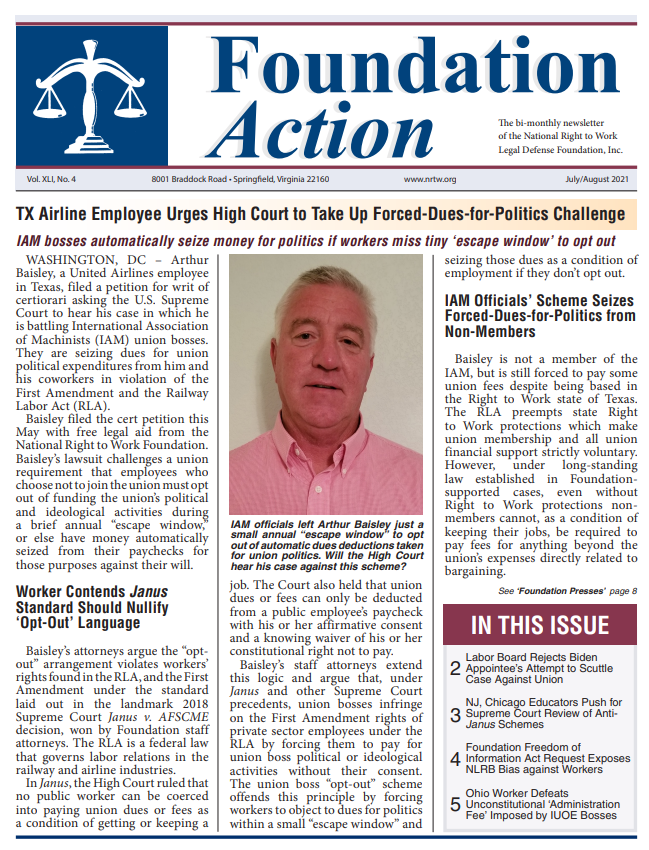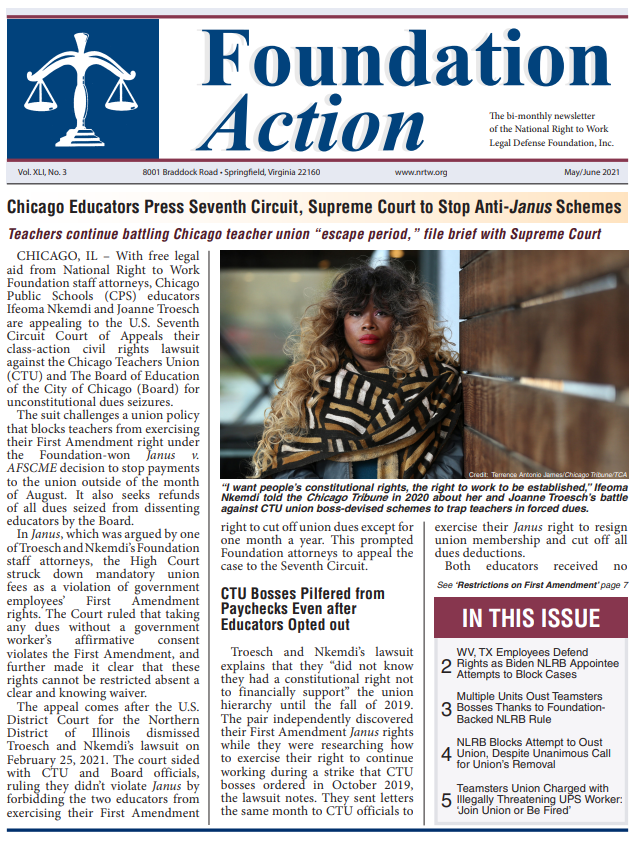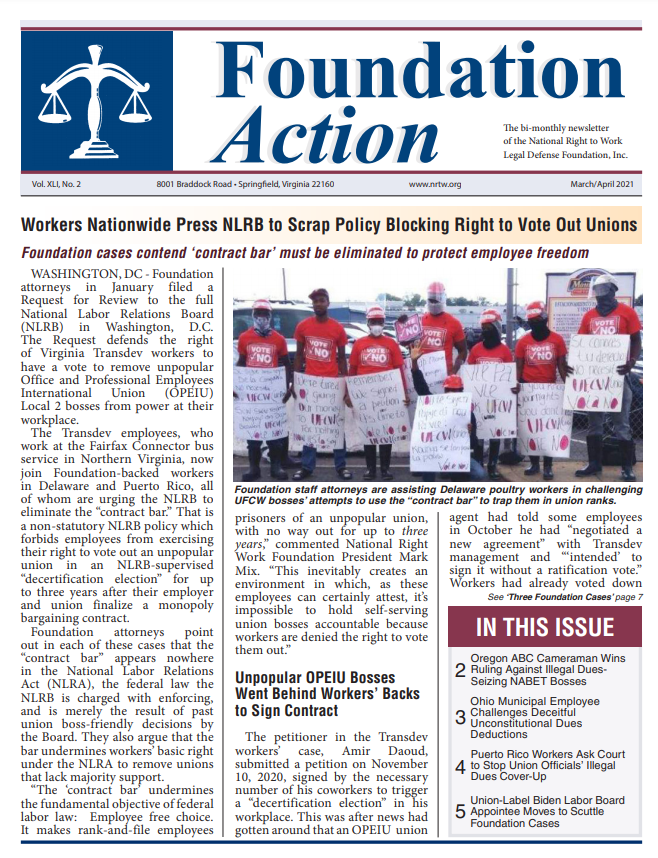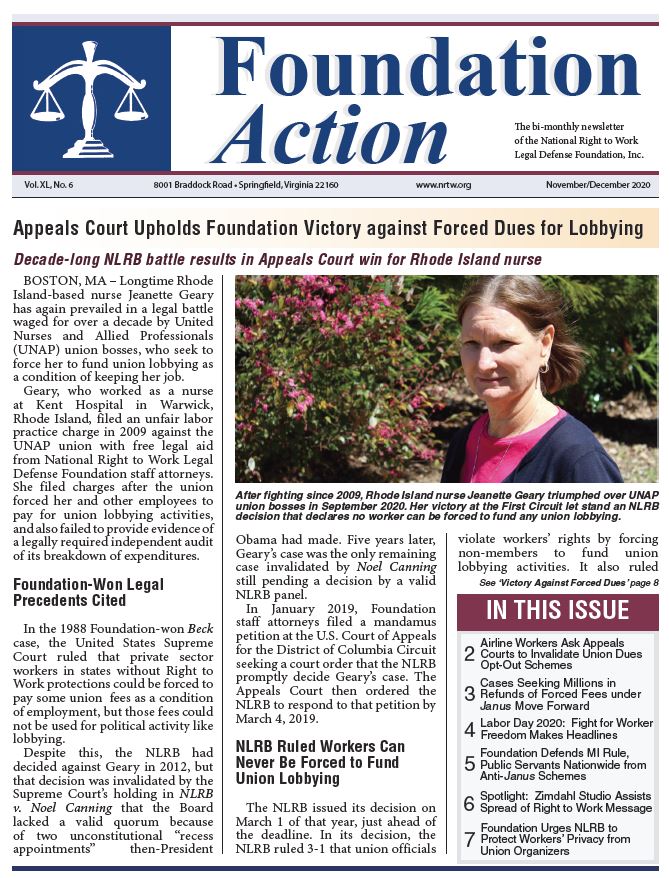National Right to Work Foundation President Says Cedar Point Nursery SCOTUS Decision One Step in Nixing Coercive Union Power
Yesterday the U.S. Supreme Court ruled 6-3 in Cedar Point Nursery v. Hassid that a California law forcing farmers to let union agents occupy their property for solicitation to workers violates farmers’ private property rights.
National Right to Work Foundation President Mark Mix emphasized that there is still a long battle ahead in eliminating the many government-granted special privileges given only to union officials:
“While the Court’s ruling ends one example of a special power granted to unions but not any other type of private organization in the country, there remains much to do to roll back the numerous other government-granted coercive powers that union bosses use to expand their power over American workplaces, often in violation of individual workers’ rights.
“Union officials can still force their so-called ‘representation’ on workers who do not want and never asked for it, force employers to hand over workers’ private contact information even over workers’ objections, and, in states that lack Right to Work laws, force nonmember workers to pay money to the union under threat of termination.”
Recently, Foundation staff attorneys have represented rank-and-file workers for free in many cases challenging these privileges, including a case for Indiana workers who were forced under union “representation” despite them unanimously voting to oust the union, a case for a Rhode Island nurse who was defending her right not to pay for union lobbying as a condition of employment, and a case where a Delaware worker is challenging union officials’ ordering his employer to turn over his private information.
Click here for the National Right to Work Foundation’s list of “Big Labor’s Top Ten Special Privileges.”
Foundation President Discusses How Teacher Union Bosses Influence the Government to the Detriment of Teachers and Students
National Right to Work Legal Defense Foundation President Mark Mix recently participated in a Philanthropy Roundtable panel discussion titled “Ask The Experts: Teacher Appreciation Week? How Teachers Unions Got in the Way.”
In response to a question about how teacher union officials are influencing school reopening decisions, he noted that union bosses’ power stems from their government-granted monopoly bargaining privileges:
“At its core union monopoly bargaining (also called ‘exclusive representation’) in the government sector is inherently anti-democratic because it forces elected officials to “negotiate” with union bosses over public policy, including how government schools are run. That has always been true, but the response to COVID from government union officials in general and teacher union officials in particular only reinforces how union officials wield their government-granted exclusive representation powers to undermine and oppose policies that are in the interest of the public, taxpayers and students. There are examples of this across the country, but among the most egregious were sweeping demands by United Teachers Los Angeles union officials that included a wealth tax, defunding the police, Medicare for All and a moratorium on charter schools all as a condition of reopening Los Angeles public schools.”
Mix describes how organizations like the National Right to Work Foundation can counter union bosses’ undue influence:
“One key way to push back is to remind the public that despite the claims of union bosses like [Randi] Weingarten, many teachers oppose what union officials do in their name. Teacher union efforts to undermine the Janus v. AFSCME Supreme Court precedent in particular show how union officials put their own power and influence ahead of those they claim to ‘represent,’ often in violation of the First Amendment.”
Mix cites two Foundation cases that illustrate this point:
“Two ongoing National Right to Work Foundation Janus enforcement cases for teachers against the Los Angeles and Chicago teacher unions were brought by teachers who originally sought to cut off union financial support when they rebuffed union strike demands that they felt were not in the best interests of their students.”
Ifeoma Nkemdi, one of the Chicago teachers who sued the Chicago Teachers Union for restricting her right to cut off union dues, described the union bullying she faced in an interview with the Foundation:
As long as union bosses have monopoly bargaining powers, Mix explains, teacher union officials will continue to undermine efforts to do what is best for students:
“The ultimate solution is to end government monopoly bargaining, either through the courts because it violates the First Amendment protections for free speech and freedom of association for teachers forced under unwanted union monopoly ‘representation,’ or by state legislators who see the detrimental impact of granting one special interest group such unique powers that let them effectively veto the will of the voters’ elected representatives. Currently in many states teacher unions are not granted such powers, and it doesn’t mean teacher unions don’t exist, simply that their role is as a voluntary association that can lobby for the interests of its members, no different from any other interest group. That is the proper role for teacher unions because, among other reasons, the education of future generations shouldn’t be a subject of bargaining negotiations with teacher union bosses. ”
Read the entire discussion here.
Full Foundation Action January/February 2021 Newsletter Now Online
All articles from the January/February issue of Foundation Action are now on the website.
In this issue:
- More Workers Ask Supreme Court to Refund Unconstitutional Forced Dues
- Flight Attendant Sues Transport Union for Religious Discrimination
- Foundation Battles Union Restrictions on First Amendment Rights at Ninth Circuit
- Foundation Defends MI Rule, Public Servants Nationwide from Anti-Janus Schemes
- NLRB to Prosecute Boston Hotel, UNITE HERE Union for Coercive “Card Check” Deal
- Vegas Security Guards Win $4,200 in Case Challenging Illegal Dues Seizures
Recent articles can be found here. To sign up for a free copy of the newsletter via mail please see the form at the bottom of this page.
Full Foundation Action November/December 2020 Newsletter Now Online
All articles from the November/December issue of Foundation Action are now on the website.
In this issue:
- Appeals Court Upholds Foundation Victory against Forced Dues for Lobbying
- Airline Workers Ask Appeals Courts to Invalidate Union Dues Opt-Out Schemes
- Cases Seeking Millions in Refunds of Forced Fees under Janus Move Forward
- Foundation Defends MI Rule, Public Servants Nationwide from Anti-Janus Schemes
- Foundation Urges NLRB to Protect Workers’ Privacy from Union Organizers
Recent articles can be found here. To sign up for a free copy of the newsletter via mail please see the form at the bottom of this page.
Video: Chicago Teacher Stands Up to Union Bullying
Ifeoma Nkemdi teaches second grade at Newberry Math and Science Academy in Chicago. She exercised her right to opt out of the Chicago Teachers Union (CTU) and continue teaching her students during a CTU strike in 2019.
Union agitators berated Nkemdi for returning to her classroom and confronted her as she entered the school. In the video below, Nkemdi says “They specifically waited for me. They were supposed to be in front of the school. They all went to the back to wait for me to enter the school, began using their cell phones to record me and berate me and call me names.”
Nkemdi wasn’t alone. She describes how another teacher who had opted out of the union was “beat up by her coworkers.” She says union officials refused to condemn the violence, arguing “they didn’t send a letter out to the teachers saying ‘this is inappropriate behavior…this is not what we do.’ And because I didn’t see that I knew I made the right decision [to opt out].”
Nkemdi did not back down in the face of union bullies. She and fellow Chicago educator Joanne Troesch filed a class action lawsuit against the CTU and the Chicago Board of Education. The suit challenges the “escape period” created by the union, which only allows teachers to stop dues deductions in the month of August.
When Troesch and Nkemdi sent letters to the union resigning their memberships in October 2019, union officials informed them that dues deductions would continue “until September 1, 2020.” Her lawsuit says this is a clear violation of the Supreme Court’s holding in the Foundation-won Janus v. AFSCME case that dues cannot be taken from public employees without their clear and affirmative consent.
CTU officials did not inform Troesch or Nkemdi that they had the right to stop their dues payments. Troesch and Nkemdi learned about their Janus rights only after doing their own research.
At every turn, the CTU made it difficult for these school employees to exercise their rights. They were never informed of their rights, were forced to wait almost a year for their request to end dues deductions to be met, and were subject to harassment and ridicule by union militants.
Nkemdi finds the behavior of the CTU disheartening. “I just felt it was such a dishonor to the profession of education,” she explained. “This extreme bullying because I didn’t agree…and they did it in front of students.”
You can listen to Ifeoma Nkemdi tell her story below:

